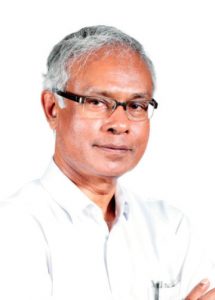
Dr Michael Jeyakumar
President, Parti Sosialis Malaysia
IT WILL BE A challenging 2022 as a large backlog of non-Covid-19 cases needs to be cleared. It is because investigations and treatment were delayed due to the pandemic.
Parti Sosialis Malaysia (PSM) President Dr Michael Jeyakumar said more of the M40 group who previously turned to the private sector will now come to the government sector as they are short on funds due to the effects of the lockdowns.
“The government has difficulty increasing the health budget to the level it should because of the pressure to bring down the budget deficit as soon as possible. They are also anxious that Malaysian securities will be downgraded internationally.
Asked the three most important health issues that needed to be addressed in the Malaysian healthcare sector, he said: “We need to address the question whether the provision of a high level of healthcare is part of the social contract.
“The 12th Malaysia Plan says in 4-22 that the government will gradually get the people to bear their costs, and the government will only pay for the poor. (Read also the footnote in that page). That’s one view.
“There are others, including the argument that Malaysians are not being compensated adequately for their work (ie there is wage suppression in Malaysia). The people have a right to expect subsidised healthcare. It’s part of the social wage in the ‘social contract’.”
Temporary moratorium on private hospitals
He said the government needed to accept that new private hospitals accelerate the brain drain of specialists and experienced nursing staff. We are already relatively short of specialists in government hospitals.
He added that if the above was acknowledged, we could start discussing measures like a temporary moratorium on new private hospitals. However, people in government – BN, PN and PH – think it’s all right to open new private hospitals as that can bring in health tourists and investments.
Dr Jeyakumar also said the issue of funds has to be tackled. Many commentators and health NGOs will give a wish list.
“But most programmes will cost money. The government already spends 10 per cent of the federal budget on the Health Ministry. Where will the extra funds come from?
“Where are the leakages? Can they be plugged, and how? Can specific Ministries do with less?
Leakages in procurements
He also asked if the government could introduce a wealth tax or a tax on financial transactions. He wondered if that would lead to capital flight and hurt us in the long term.
“Is ‘debt monetisation’ an option we should consider? It is a serious and complicated subject, and getting it wrong can have quite significant adverse effects on the nation. But we need to address it.”
As for the 12th Malaysia Plan, he said it was relatively superficial. It does not identify and address the issues plaguing the health system.
The Plan ends up with generalities and platitudes. It talks of increasing the doctor population ratio. There is no mention of the fact that almost 40 per cent of the doctors in government service are contract officers and there are insufficient facilities to train them properly.
“The over-production of medical graduates (and nursing graduates) due to profit-driven private colleges is not addressed. The ‘capture’ of the regulatory bodies by these private colleges is not addressed.
“For example, on Pages 4-20, it says ‘a blueprint for Health Care Reform will be introduced’. Come on. This MP12 is not a spur of the moment document. It’s been in gestation for five years. And all the Plan can say is that a ‘study will be undertaken’ to draw up the blueprint?”
On the issue of rising healthcare costs in recent years, he said this was because medical technology was increasing, and we can offer more treatment options now compared to the past.
“The development and marketing of new medicines and technologies are mainly by for-profit companies who use the patent laws to create monopoly positions and raise prices.
“There are also leakages in the procurement of goods and services by the government hospitals. There have been many instances of over-priced and poor-quality goods, delays in hospital construction, etc.”
He said healthcare should be seen as part of the social contract, and the government should provide it with low co-payments.
He said it was possible to introduce a national health insurance scheme, but some groups will contest such attempts.
“If the wages of Malaysian workers were like that in the EU or the US, then getting people to contribute towards the safety net is fair. But when there is wage suppression – our median factory wage is about 1/8 to 1/6 of the German median factory wage – a further deduction of the salary of our average worker is quite unfair.”
He said the government would have difficulty moving in this direction as it would be quite unpopular and politically costly. KHIRTINI K KUMARAN — The Health








